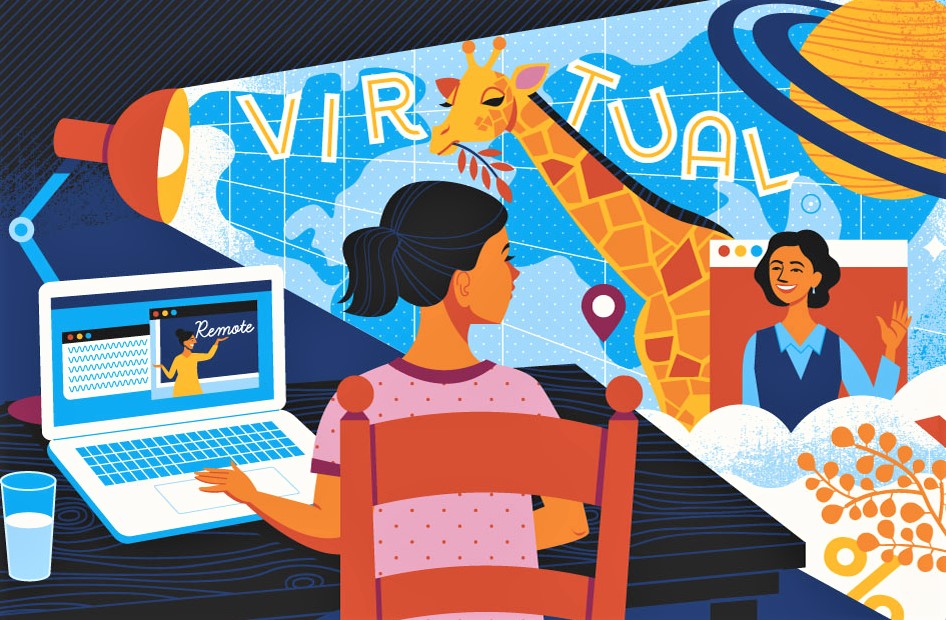September is here with more AI-powered learning tools available than ever before as students head back to school. The last 18 months have accelerated the adoption of connected learning environments. For those standing at the front of the classroom (real or virtual), the application of technology has one primary goal: a teacher’s time is their most limited resource and technology can help teachers reallocate 20 to 30 percent of their time toward activities that support student learning.
AI cannot replace the many uniquely human attributes that make teachers valuable to students. Teachers help build positive school and class climates, resolve conflicts, create connection and belonging, and inspire students. The promise of AI in the classroom context is to empower teachers to spend more quality time with their students.
In online learning scenarios, chatbots can leverage NLP capabilities to answer simple questions and flag complex questions. Additionally, AI can help tailor personalized content to different learning styles for individual students, helping teachers break away from the one-size-fits-all approach for delivering a minimum standard of education. With most students accustomed to real-time engagement, AI systems offering instant feedback can be a powerful learning tool. Combined with learning analytics, teachers can better understand student needs and make informed decisions to drive learning impact.
There are many considerations behind the deployment of any edtech, such as its capacity to adapt in a rapidly changing world and to ensure it does not undermine elements of creativity and spontaneity in teaching. The application of AI in the classroom should ultimately enable personalized learning that helps students reach their full potential.
AI News This Week
-
Implementing machine learning in medicine (CMAJ)
Our friend, Professor Marzyeh Ghassemi, published a 3-phase framework for assessing the development and adoption of machine-learned solutions in healthcare. This includes an exploration phase to understand the problem being addressed and the deployment environment; a solution design phase, for the development of machine-learned models and user-friendly tools; and an implementation and evaluation phase to deploy and assess the impact of the machine-learned solution.
-
Toronto tech smashed venture funding records in Q2 with $1.46 billion raised (Betakit)
Toronto-based tech startups raised a total of $1.46 billion through 68 announced deals last quarter. Toronto saw a 28 percent increase in total investment compared to the first quarter of 2021 and a 555 percent increase since Q2 2020. The quarter was Toronto’s largest ever in terms of investment. Canada still lags behind its innovation hub counterparts, with Toronto ranking last on dollars raised-per-technical employee in 2020, with approximately $4,300 raised per person, 1/30th the $130,000 per person raised in the Bay Area.
-
Only humans, not AI machines, can get a U.S. patent, judge rules (Bloomberg)
The buzz has grown around AI and computer-created innovation as researchers and artists speculate if AI could be an inventor. A federal judge ruled in the first American decision this week that a computer using AI cannot be listed as an inventor on patents because only a human can be an inventor under U.S. law. The judgment follows University of Surrey Law Professor Ryan Abbott’s global effort to get a computer listed as an inventor. This U.S. ruling challenges separate decisions in South Africa and Australia.
-
Experience leads to greater trust in AI-driven decisions (Cognizant)
A lack of knowledge around AI can lead to low trust and therefore limited application. In this vicious cycle, the use of AI and trust in AI go hand-in-hand. ESI Thoughtlab conducted a comprehensive CATI survey examining this phenomenon, polling senior executives at 1,000 companies in 11 industry sectors with an average revenue of $7 billion. The consensus is that greater experience deploying and leveraging AI tools leads to greater confidence in AI-driven decisions.
-
An introduction to AI for social good (TOPBOTS)
AI for social good (AI4SG) is a relatively new research field that focuses on tackling significant social, environmental, and public health challenges that exist today using AI. For example, researchers have modelled social networks of homeless individuals to counter the spread of HIV, a network disproportionately impacted by the disease.
Radical Reads is edited by Ebin Tomy (Analyst, Radical Ventures)

